UNIT 1 FESTIVALS AROUND THEWORLD
20版:(步步高) (全国) Unit 1 Festivals around the world
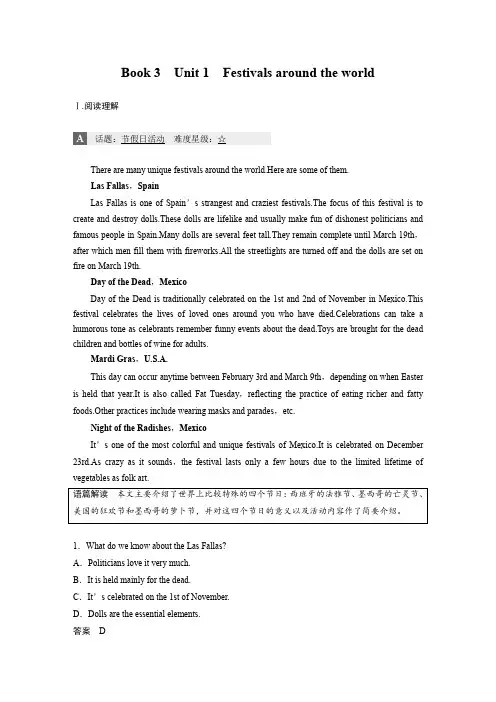
Book 3Unit 1Festivals around the worldⅠ.阅读理解话题:节假日活动难度星级:☆There are many unique festivals around the world.Here are some of them.Las Fallas,SpainLas Fallas is one of Spain’s strangest and craziest festivals.The focus of this festival is to create and destroy dolls.These dolls are lifelike and usually make fun of dishonest politicians and famous people in Spain.Many dolls are several feet tall.They remain complete until March 19th,after which men fill them with fireworks.All the streetlights are turned off and the dolls are set on fire on March 19th.Day of the Dead,MexicoDay of the Dead is traditionally celebrated on the 1st and 2nd of November in Mexico.This festival celebrates the lives of loved ones around you who have died.Celebrations can take a humorous tone as celebrants remember funny events about the dead.Toys are brought for the dead children and bottles of wine for adults.Mardi Gras,U.S.A.This day can occur anytime between February 3rd and March 9th,depending on when Easter is held that year.It is also called Fat Tuesday,reflecting the practice of eating richer and fatty foods.Other practices include wearing masks and parades,etc.Night of the Radishes,MexicoIt’s one of the most colorful and unique festivals of Mexico.It is celebrated on December 23rd.As crazy as it sounds,the festival lasts only a few hours due to the limited lifetime of vegetables as folk art.语篇解读本文主要介绍了世界上比较特殊的四个节日:西班牙的法雅节、墨西哥的亡灵节、美国的狂欢节和墨西哥的萝卜节,并对这四个节日的意义以及活动内容作了简要介绍。
Unit-1-Festivals-around-the-world-课文知识点解析1
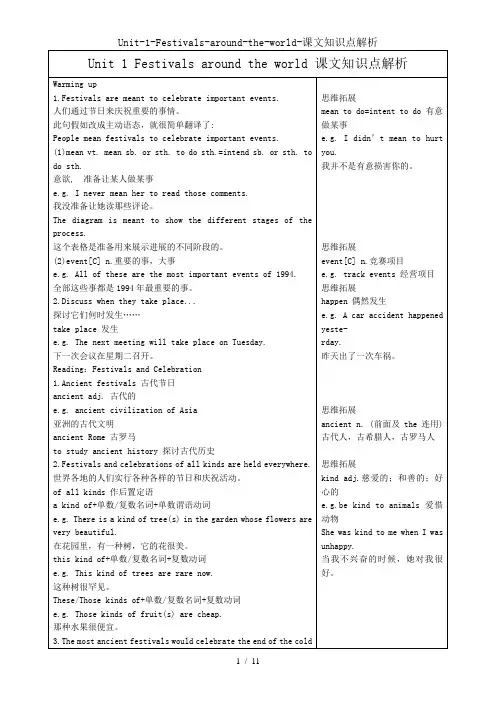
7....when people should go to clean the graves and light incense in memory of their ancestors.
……这时候,人们去扫墓,点上香火祭祀祖先。
memory[ C usually plura] n. 表示所记住的事情,记忆
starve vt.&vi. 挨饿,饿死
e.g. Thousands of people will starve if food doesn’t reach the stricken city.
假如食物无法到达这座受灾的城市,成千上万的人将会饿死。
5.They lit fire and made music because they thought these festivals would bring a year of plenty.
他们把食物, 鲜花和礼物献给死者。
offer sth. to sb.= offer sb.sth.供应某物给某人
e.g. He offered me 300 dollars for that television.
他出300美元向我买那部电视机。
12.The festival of Halloween had its origin as an event in memory of the dead.
万圣节起源于纪念已逝的人们。
had its origin as an event 起源于某事
have your or its origin=begin 开始
e.g.Many of the problems had their origin in post-war Europe.
人教版高中英语必修3课文翻译
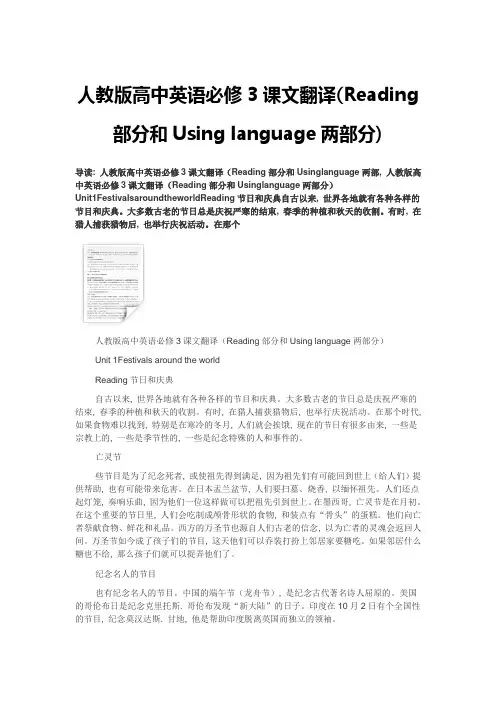
人教版高中英语必修3课文翻译(Reading 部分和Using language两部分)导读: 人教版高中英语必修3课文翻译(Reading部分和Usinglanguage两部, 人教版高中英语必修3课文翻译(Reading部分和Usinglanguage两部分)Unit1FestivalsaroundtheworldReading节日和庆典自古以来, 世界各地就有各种各样的节目和庆典。
大多数古老的节日总是庆祝严寒的结束, 春季的种植和秋天的收割。
有时, 在猎人捕获猎物后, 也举行庆祝活动。
在那个人教版高中英语必修3课文翻译(Reading部分和Using language两部分)Unit 1Festivals around the worldReading节日和庆典自古以来, 世界各地就有各种各样的节目和庆典。
大多数古老的节日总是庆祝严寒的结束, 春季的种植和秋天的收割。
有时, 在猎人捕获猎物后, 也举行庆祝活动。
在那个时代, 如果食物难以找到, 特别是在寒冷的冬月, 人们就会挨饿, 现在的节日有很多由来, 一些是宗教上的, 一些是季节性的, 一些是纪念特殊的人和事件的。
亡灵节些节目是为了纪念死者, 或使祖先得到满足, 因为祖先们有可能回到世上(给人们)提供帮助, 也有可能带来危害。
在日本盂兰盆节, 人们要扫墓、烧香, 以缅怀祖先。
人们还点起灯笼, 奏响乐曲, 因为他们一位这样做可以把祖先引到世上。
在墨西哥, 亡灵节是在月初。
在这个重要的节日里, 人们会吃制成颅骨形状的食物, 和装点有“骨头”的蛋糕。
他们向亡者祭献食物、鲜花和礼品。
西方的万圣节也源自人们古老的信念, 以为亡者的灵魂会返回人间。
万圣节如今成了孩子们的节目, 这天他们可以乔装打扮上邻居家要糖吃。
如果邻居什么糖也不给, 那么孩子们就可以捉弄他们了。
纪念名人的节目也有纪念名人的节目。
中国的端午节(龙舟节), 是纪念古代著名诗人屈原的。
高考英语一轮复习提能练(十一)Unit1Festivalsaroundtheworld(含解析)
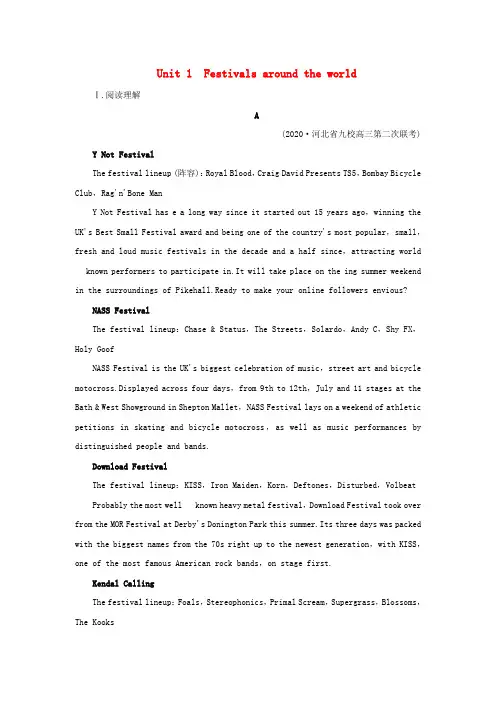
Unit 1 Festivals around the world Ⅰ.阅读理解A(2020·河北省九校高三第二次联考) Y Not FestivalThe festival lineup (阵容):Royal Blood,Craig David Presents TS5,Bombay Bicycle Club,Rag'n'Bone ManY Not Festival has e a long way since it started out 15 years ago,winning the UK's Best Small Festival award and being one of the country's most popular,small,fresh and loud music festivals in the decade and a half since,attracting world known performers to participate in.It will take place on the ing summer weekend in the surroundings of Pikehall.Ready to make your online followers envious?NASS FestivalThe festival lineup:Chase & Status,The Streets,Solardo,Andy C,Shy FX,Holy GoofNASS Festival is the UK's biggest celebration of music,street art and bicycle motocross.Displayed across four days,from 9th to 12th,July and 11 stages at the Bath & West Showground in Shepton Mallet,NASS Festival lays on a weekend of athletic petitions in skating and bicycle motocross,as well as music performances by distinguished people and bands.Download FestivalThe festival lineup:KISS,Iron Maiden,Korn,Deftones,Disturbed,Volbeat Probably the most well known heavy metal festival,Download Festival took over from the MOR Festival at Derby's Donington Park this summer.Its three days was packed with the biggest names from the 70s right up to the newest generation,with KISS,one of the most famous American rock bands,on stage first.Kendal CallingThe festival lineup:Foals,Stereophonics,Primal Scream,Supergrass,Blossoms,The KooksAnnually Kendal Calling mixes a diverse and well known lineup that covers various types,while also laying on a wide range of food and drink,as well as entertainments,bars,and a market.As a result,it's a perfect festival to take the family to.All in the beautiful surroundings of Lowther Deer Park.1.Which festival bines games with music?A.Kendal Calling. B.Download Festival.C.NASS Festival. D.Y Not Festival.C[考查细节理解。
原创:Unit 1 Festivals around the world
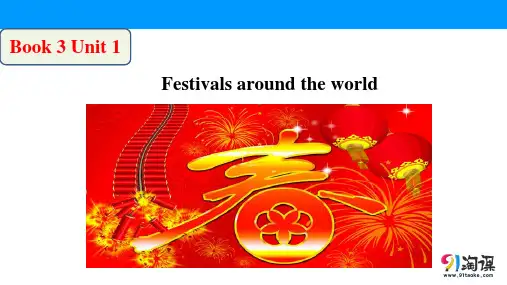
6.We got separated two years ago, and now we are looking forward to seeing each other again.
赞赏者;羡慕者;追求者
(4)admiring adj.
赞赏的;羡慕的
三.常考词汇细点拨
admire
即学即练 Ⅰ.对比填空
①我对她所做的事情很钦佩。 ①-1 I admire her for what she has done.(admire) ①-2 I have admiration for what she has done. (admiration)
remind
Ⅲ. 单项 填空
④(2012·全国卷Ⅱ)Mary, I______John of his promise to
help you.
A.told
B.reminded
C.warned
D.advised
解析:考查动词词义辨析及其搭配。根据of的提示,首先
排除A和D; remind sb. of sth.表示“提醒某人某事”;warn
三.常考词汇细点拨
apologize
Ⅱ.句型转换 ④He apologized to her for not replying to her letter in time. → He made/offered an apology to her for not replying to her letter in time. → He offered her an apology for not replying to her letter in time.
《高中英语新课标-必修1-Unit1 Festivals around the world 课件》
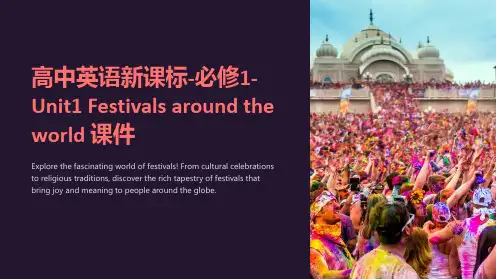
不同国家和文化中的节日
了解世界各国和不同文化中的庆典与节日,体验不同人群庆祝节日的方式, 感受文化的多样性与人类共同的欢庆。
节日的文化意义
探究节日在不同文化中的重要地位,了解它们对于文化传统、身份认同和价 值观的深远影响。
节日的历史渊源
追寻节日的历史根源,了解节日与人类历史和传统之间的联系,以及随着时 间推移如何演变和发展。
宗教节日及其意义
探索各大宗教中的重要节日,了解它们在信仰和宗教-必修1Unit1 Festivals around the world 课件
Explore the fascinating world of festivals! From cultural celebrations to religious traditions, discover the rich tapestry of festivals that bring joy and meaning to people around the globe.
为什么庆祝节日?
了解不同文化中庆祝节日的原因,从人们的欢乐和团结之中体会为什么庆祝节日的重要性。
世界各地不同类型的节日
探索世界各地独特的节日,从传统文化节日到现代庆典,领略各种不同类型 的节日给人们带来的喜悦与意义。
节日 - 生活的庆祝
了解节日作为人们庆祝与享受生活的方式,体验节日带来的喜庆氛围与人们 团聚的温暖。
《高一英语课件:Unit1Festivalsaroundtheworld》
4 Historical Festivals
Reenacting or remembering historical events or periods.
Festivals aroundthe world
1
China: Spring Festival
Experience the awe-inspiring
Holi
Join the fun-filled festivities of colors, water balloons, and joyous dances during the Festival of Spring.
Raksha Bandhan
Experience the bond of love and protection between brothers and sisters through tying of rakhi.
2 ReligiousFestivals
Observing and honoring religious beliefs and significant events.
3 National Festivals
Commemorating national achievements, independence, or important historical moments.
Reasons for Celebrating Festivals
1 CulturalPreservation
Preserve and pass down cultural traditions, customs, and rituals to future generations.
2 Community Bonding
Unit1Festivalsaroundtheworld课文知识点解析
Unit 1 Festivals around the world 课文知识点解析Warming up1.Festivals are meant to celebrate important events.人们通过节日来庆祝重要的事情。
此句如果改成主动语态,就很容易翻译了:People mean festivals to celebrate important events.(1)mean vt. mean sb. or sth. to do sth.=intend sb. or sth. todo sth.意欲、打算让某人做某事e.g. I never mean her to read those comments.我没打算让她读那些评论。
The diagram is meant to show the different stages of the process.这个表格是准备用来展示进展的不同阶段的。
(2)event[C] n.重要的事,大事e.g. All of these are the most important events of 1994.所有这些事都是1994年最重要的事。
2.Discuss when they take place...讨论它们何时发生……take place 发生e.g. The next meeting will take place on Tuesday.下一次会议在星期二召开。
Reading:Festivals and Celebration1.Ancient festivals 古代节日ancient adj. 古代的e.g. ancient civilization of Asia亚洲的古代文明ancient Rome 古罗马to study ancient history 研究古代历史2.Festivals and celebrations of all kinds are held everywhere. 世界各地的人们举行各种各样的节日和庆祝活动。
高中英语 Unit 1 Festivals around the world Period 1 Wa
Unit 1 Festivals around the world单元要览类别课程标准要求掌握的项目话题Festivals; how festivals begin; how to celebrate festivals词汇beauty n. 美; 美人award n. 奖; 奖品vt. 授予harvest n. & vt. & vi. 收获; 收割rooster n. 雄鸡; 公鸡celebration n. 庆祝; 祝贺admire vt. 赞美; 钦佩; 羡慕starve vt. & vi. (使)饿死; 饿得要死energeticadj. 充满活力的; 积极的origin n. 起源; 由来; 起因custom n. 习惯; 风俗religious adj. 虔诚的; 宗教上的clothing n. 衣服ancestor n. 祖先; 祖宗worldwideadj. 遍及全世界的feast n. 节日; 盛宴permissionn. 许可; 允许belief n. 信任; 信心; 信仰fool n. 愚人vt. 愚弄vi. 干傻事trick n. 诡计; 恶作剧; 窍门apologizevi. 道歉; 辩白arrival n. 到来; 到达; 到达者drown vt. & vi. 溺死; 淹死gain vt. 得到; 获得obvious adj. 明显的; 显而易见的independencen. 独立; 自主remind vt. 提醒; 使想起gather vt. , vi. & n. 集合;聚集weep n. 哭vi. 哭泣; 流泪agriculture n. 农业; 农艺; 农学forgive vt. 原谅; 饶恕短语take place发生turn up出现; 到场in memory of纪念; 追念keep one’s word守信用; 履行诺言dress up盛装; 打扮; 装饰hold one’s breath屏息; 屏气play a trick on搞恶作剧; 诈骗; 开玩笑set off出发; 动身; 使爆炸look forward to期待; 期望; 盼望remind. . . of. . . 使……想起……day and night日夜; 昼夜; 整天be proud of以……而自豪as though好像in the shape of以/呈现……的形式/形状have fun with玩得开心be covered with被……所覆盖重要句型1. . . . people would starve if food was difficult to find. (the subjunctive mood)2. The country, covered with cherry tree flowers, looks as though it iscovered with pink snow. (as though. . . )3. Finding that. . . , her grandmother finally decided. . . (the presentparticiple used as adverbial. )4. It was obvious that the manager of the coffee shop was waiting. . .(It is+adj. +that. . . )5. “. . . I don’t want them to remind me of her. ” So he did. (So+S.+do/does/did. )6. There was Hu Jin waving at him and calling, . . . (Inversion)功能 1. Making phone callsMay I speak to. . . ?Can I ring/call back later?Hold/Hang on, please.I’ll ring him/her up again.Just a moment, please.Sorry, he/she isn’t here right now.2. InvitationsI wonder if you are interested in. . . .I’d like to invite you to. . . .Would you like. . . ?Could/Would you please. . . ?I’m looking forward to. . . .I’d love to, but. . . .3. ThanksThank you so much.Thanks a lot.That’s very kind of you.You’re most welcome.Don’t mention it.It’s a pleasure.语法The use of can, could, may, might, will, would, shall, should, must, can’t1. can and couldJin can speak English well. (ability)Could you please show me the way to Beihai Park? (request)2. may and mightMay we see the awards for the teams? (permission; request)She might give you some new clothing. (possibility)3. will and wouldThe Spring Festival is the most fun. The whole family will come for dinner.(promise; agreement)Often he would dress up like a rich man. (past habit; custom)4. shall and shouldThe harvest festival begins on Sunday. We shall be there with our friends.(promise; agreement)You should arrive at the airport two hours before he goes. (advice)5. must and can’tWang Feng wins an award every year. He must be very strong. (speculation) You must be joking. That can’t be true. (guessing)教学重点1. Get students to know about festivals around the world.2. Have students learn some useful new words and expressions about festivals and customs and let them learn effective ways to remember English vocabulary.3. Enable students to grasp and use the expressions of request and thanks.4. Let students learn the new grammar item: the use of can, could, may, might, will, would, shall, should, must and can’t.5. Develop students’ listening, speaking, reading and writing abilities.教学难点1. Enable students to master the use of can, could, may, might, will, would, shall, should, must and can’t.2. Let students learn to write a different ending of a story.3. Develop students’ integrative skills.课时安排Periods needed: 7Period 1 Warming up and readingPeriod 2 Learning about language: Important language points Period 3 Learning about language: GrammarPeriod 4 Using language: Listening and speakingPeriod 5 Using language: Extensive readingPeriod 6 Using language: Speaking and writingPeriod 7 Revision: Summing up and learning tipPeriod 1 Warming up and reading整体设计教材分析This is the first teaching period of this unit. At the beginning of the class, the teacher can lead in the topic of the unit by having a free talk with students about their winter holidays and the Spring Festival.The Warming Up is intended to have students start thinking about the variety of events and festivals that are celebrated in China, and connect them with seasons of the year and reasons for the celebrations. The teacher can use this part to introdu ce information that Chinese students should have about their country’s cultural events.The Pre-reading is a continuation of the Warming Up and it moves the discussion to a more personal level. It is intended to help students enter imaginatively into a discussion of festivals and their importance to the society. It also directs their attention to the variety of events and activities those festivals include. The teacher should let students discuss the questions and predict what kind of information will be introduced in the Reading.The reading passage titled FESTIVALS AND CELEBRATIONS briefly describes the earliest kinds of festivals with the reasons for them, and then four different kindsof festivals that occur in most parts of the world. Encourage students to look at the pictures and the heading of each section to guess what the text might be about. Then let them skim for the general idea for each section, and scan for further understanding. Because this passage introduces a lot of useful new words and expressions which are only used for festivals, in order not to let students feel much difficult, the teacher should deal with any language problems while they are reading. After reading, students are required to do the four exercises in the Comprehending to see how much they have understood the reading passage. The teacher can first let them work in pairs or in groups to find the answers cooperatively, and then check their answers with the whole class.To consolidate the contents of the reading passage, students should be required to talk about festivals in their own words at the end of the class. In order to arouse students’ interest, the teacher can hold a competition between groups.教学重点1. Let students learn more about history and basic knowledge of festivals.2. Get students to learn different reading skills.教学难点1. Develop students’ reading ability.2. Enable students to talk about festivals and celebrations.三维目标知识目标1. Get students to learn the useful new words and expressions in this part: beauty, harvest, starve, origin, religious, ancestor, Mexico, feast, bone, belief, poet, arrival, gain, independence, gather, agriculture, award, rooster, admire, energetic, Easter, clothing, Christian, custom, take place, in memory of, dress up, play a trick on, look forward to, day and night, as though, have fun with2. Let students learn about history and basic knowledge of festivals both in and out of China.能力目标1. Develop students’ reading ability and let them learn different reading skills.2. Enable students to talk about festivals and celebrations.情感目标1. Stimulate students’ love for their own national culture and customs.2. Develop students’ sense of cooperative learning.教学过程设计方案(一)→Step 1 Leading-inHave a free talk with students. Ask them the following questions:Did you have a good time in your winter holidays?When did you feel most happy and excited? Why?(At the Spring Festival. Because it’s the most important festival in ourcountry. . . )→Step 2 Warming up1. Let students brainstorm the other Chinese festivals.(Lantern Festival, Pure Brightness Festival, Dragon Boat Festival, Mid-Autumn Festival, New Year’s Day, Chung Yeung Festival. . . )2. Let students read the information about Chinese festivals below and discuss another three Chinese festivals:When does the festival come?What do people celebrate?What do people do?Festivals Date Festivals DateNew Year January 1st Teachers’ Day September 10th InternationalWomen’s DayMarch 8th National Day October 1stArbor Day March 12th The Spring Festival Lunar New YearInternational Labor Day May 1st Dragon BoatFestivalthe fifth day of the fifthlunar monthInternational Children’s Day June 1st Mid-AutumnFestivalthe 15th day of the 8thlunar monthArmy Day August 1st Lantern Festival the 15th day of the 1stlunar monthChinese Youth Day May 4th Pure Brightness Day April the fifth3. Ask students to fill in the following form and ask some to share their opinions with the whole class. The first one is given as an example.Festivals Time of year/date What it celebrates What people doMid-Autumn Festival autumn/fall the beauty of thefull moon, harvest,time with familyand friendsgive/eat moon cakesand watch the fullmoon with familyand friends4. Talk about some foreign festivals with students.(Christmas, April Fools’ Day, Easter, Halloween, Valentine’s Day, Thanksgiving Day, . . . )→Step 3 Pre-reading1. Let students discuss the following questions:What festivals or celebrations do you have in your city or town? What part of a festival do you like best—the activities, the music, the sights, the food or the people who visit?2. Ask students to look at the pictures and title of the passage in Reading. Discuss in pairs what kind of information will be introduced in the passage.→Step 4 Reading1. Fast readingAsk students to skim the reading passage and then fill in the following chart.Kinds of Festivals Names of Festivals Countries FestivalsFestivalsHarvestSpring(Let students look through the chart and then read the text silently. Three minutes later, check the answers with the whole class. Show the suggested answers on the screen. )2. Intensive readingAllow students to read carefully this time to understand the main ideas of each paragraph and the important details, and then finish the following:1)Choose the best answer to each question or to finish each sentence according to the text.(1)Why do Japanese people light lamps during the Festival of the Dead?A. Because they want to make the festival colorful.B. Because they want to light up their rooms.C. Because they want to light up their way.D. Because they want to lead their ancestors to return to earth.(2)Which of the following was not mentioned as a famous person in the text?A. Mohandas Gandi.B. Christopher Columbus.C. Abraham Lincoln.D. Qu Yuan.(3)The place where people will usually decorate churches and town halls with flowers and fruits is ______________.A. IndiaB. AmericaC. EuropeD. China(4)Easter is held in memory of the return of Jesus for Christians and also celebrates ______________.A. the coming of springB. the autumn harvestC. the Lunar New YearD. the end of a yearSuggested answers: (1)D (2)C (3)C (4)A2)Use the information from the reading passage to answer the following questions.(1)What are festivals of the dead usually for?(2)What makes autumn festivals happy events?(3)What do people usually do at spring festivals?(4)What is one important reason to have festivals and celebrations?(5)Compare the festivals of the dead in Mexico, Japan and China. What things are similar? What things are different?3. Reading and discussionRead the text a third time and then work in pairs to do the following.1)Based on the reading passage, what do most festivals seem to have in common? Why do you think these things might be important to people everywhere? Talk with your partner and fill in the chart below.Three common things Reasons why they are important to people everywhere1.2.3.2)Discuss in pairs which festivals you think are the most important and which are the most fun. Then fill in the chart with your ideas.Type of festival Example of festival Reasons for yourchoiceMost importantMost fun(Let students have enough time to read the passage carefully and discuss the questions and charts with their partners. Encourage them to expand their answers according to their own experiences. )4. ExplanationHelp students analyze some difficult, long and complex sentences and guess the meanings of some new words. Encourage them to try to deal with the language points in the context.Discuss the following important sentences and phrases in the passage.1)Some festivals are held to honour the dead, or to satisfy the ancestors, who might return either to help or to do harm.2)in memory of3)India has a national festival on October 2 to honour Mohandas Gandhi, the leader who helped gain India’s independence from Britain.4)People are grateful because their food is gathered for the winter and the agricultural work is over.5)The most energetic and important festivals are the ones that look forward to the end of winter and to the coming of spring.6)The country, covered with cherry tree flowers, looks as though it is covered with pink snow.Suggested explanations:1)The sentence contains a non-restrictive attributive clause who might return either to help or to do harm. It means people hold some festivals either to show respect to the dead or to make their ancestors happy in case they might come back to do harm.2)in memory of: serving to recall sb. , to keep him fresh in people’s mindsHe wrote a poem in memory of his dearest wife, who died in an accident.in honor of: showing great respect or high public regard3)the leader who helped gain India’s independence from Britain: a noun phrase followed by an attributive clause as the appositive4)two clauses for reason5)energy n. → energetic adj. : full of or done with energylook forward to: “to” is a preposition here.I’m looking forward to hearing from you.be devoted to; be/get used to; get down to; stick to. . .6)covered with cherry tree flowers: a past participle phrase equal to “which is covered with cherry tree flowers”as though: as ifHe talks as though he knew all about it.He looks as if he had seen a ghost.5. Reading aloud and underliningAsk students to read the passage aloud to the tape and let them pay attention to the pronunciation of each new word and the pauses within each sentence. Tell them to pick out all the useful expressions or collocations from the passage while reading and copy them to the notebook after class as homework.→Step 5 ConsolidationAsk students to talk about festivals in their own words according to the text. Then let them complete the following passage with proper words or phrases.There are all kinds of festivals and ______________ around the world, which are held for different ______________. The ancient festivals were mainly held at three times a year—the end of the cold ______________, planting in spring and ______________ in autumn. Some festivals are held to ______________ the dead or ______________ the ancestors, who might return either to help or ______________, while other festivals are held to honor famous people or to the ______________, such as Dragon Boat Festival, Columbus Day, and so on. Harvest and ______________ festivals are happy events because their food is ______________ for the winter and the ______________ work is over, to which Mid Autumn Festival belongs. And the most ______________ and important festivals are the ones that ______________ the end of winter and to the coming of ______________ such as the Lunar New Year, at which people have a very ______________.Suggested answers: celebrations; reasons; weather; harvest; honor; to satisfy; to do harm; gods; Thanksgiving; gathered; agricultural; energetic; look forward to; spring; good time→Step 6 Homework1. Learn the useful new words and expressions in this part by heart.2. Read the reading passage again and again and try to talk about festivals both in and out of China.设计方案(二)→Step 1 Leading in the topic by learning vocabulary about festivals1. Make a circle on the blackboard and write the word “FESTIVAL” in it.2. Ask students, “We have learned ‘festival’. Can you name some festivals? ”3. Students list as many festivals as possible. Then the teacher adds somestudents can’t think of, such as Halloween, Easter, Thanksgiving, Valentine’s Day.4. Let students read them aloud and try to learn them by heart.→Step 2 Warming up by talking about festivalsWork in groups and list three more Chinese festivals that you know. Discuss when they take place, what they celebrate and what people do at that time. Then tell the group which festival is their favorite and why.Festivals Time of year/date What it celebrates What people doMid-Autumn Festival autumn/fall the beauty of thefull moon, harvest,time with familyand friendsgive/eat moon cakesand watch the fullmoon with familyand friends→Step 3 Predicting by looking and discussing1. Look at the pictures and title of the reading passage and discuss in pairs what the passage might be about.2. Two or three students are to give their opinions.→Step 4 Reading1. Give students 2 minutes, and ask them to skim the passage for information to tell if the following sentences are True or False.1)The ancient people needn’t worry about their food. (F)2)Halloween used to be a festival intended to honor the dead. (T)3)Qu Yuan was a great poet who people honor a lot in China. (T)4)The Mid-autumn Festival is held to celebrate the end of autumn. (F)5)Easter celebrates the birth of Jesus. (F)2. Give students 5 minutes to read the passage carefully, and complete the chart according to the passage.Festivals of the Dead Obon in Japan___________________HalloweenFestivals to Honor People ________________________________A national festival in____________ Harvest Festivals _________ in European countries_________ in China and Japan Spring Festivals ________________Carnivals in some Western countries________________________________ in Japan3. Listening and reading aloudPlay the tape of the text for students and let them pay attention to the pronunciation of each new word and the pauses within each sentence. Then ask them to read the text aloud to the tape.→Step 5 Closing down by spoken practice1. Have students get prepared in 3 minutes or so and then ask them to talk about festivals and celebrations.2. Ask as many students as possible to have a try in front of the class.→Step 6 Homework1. Go over the text and try to learn all the useful words and expressions in this part by heart.2. Finish the exercises in Comprehending on Page3.板书设计Unit 1 Festivals around the worldFestivals and celebrationsKinds of Festivals Names of Festivals Countries FestivalsFestivalsHarvestSpring活动与探究Group discussion & speechAs is known from the reading passage, festivals of all kinds are celebrated around the world. Most festivals have celebrations that include food, music, clothing and dances. These events originated from some similar ideas, but they take different forms in different regions and societies. What festivals and celebrations do you know all over the world? Have you ever taken part in them and enjoyed yourself? Discuss festivals in groups and then make speeches.Step 1: The teacher divides the class into four groups and gives the tasks to students in each group. Group 1 will list the festivals around the world as many as possible, and then categorize them according to the origins of these festivals. And they should prepare for a short speech. Group 2 will discuss two traditional Chinese festivals and prepare for their presentation. Group 3 will discuss two Western festivals and prepare for their presentation. Group 4 will discuss the differences between Chinese festivals and Western festivals, then contrast and compare their styles, celebrations, dates and so on. And they should prepare for a short speech.Step 2: Groups 1, 2 and 3 give their speeches on the festivals they have discussed. Group 4 gives their speech on the differences between Chinese festivals and Western festivals.Step 3: The teacher makes proper remarks about students’ speeches and sums up the different cultural practices between China and other countries according to them.。
Unit1Festivalsaroundtheworld(新课标版高一英语必修三教案教学设计)
Unit 1 Festivals around the world(新课标版高一英语必修三教案教学设计)Unit 1 Festivals around the worldThe First Period (Warming up & Pre-reading)Step One: Lead-inFree Talk: Did you have a good time in your winter holidays?When did you feel most happy and excited? Why?( At the Spring Festival. Because it's the most important festival in our country....)Step Two: Warming up1. Let the Ss think about the other Chinese festivals.( Lantern Festival, Pure Brightness Festival, Dragon Boat Festival, Mid-Autumn Festival, New Year's Day, Chung Yeung Festival....)2. Discussion One1)Let the Ss look at the information about Chinese festivals and discuss another four Chinese festivals according to the example in warming up: When does the festival come?What do people celebrate?What do people do?Festivals Date festivals DateNew Year January1st Teachers' Day September 10thInternational Women's Day March 8 National Day October 1stArbor Day March 12th The Spring Festival Lunar New Year International labor Day May 1st Dragon Boat Festival the fifth day of the fifth lunar monthInternational Children's Day June 1st Mid-Autumn Festivalthe 15th day of the 8th lunar monthArmy Day August 1st Lantern Festival the 15th day of the 1st lunar monthChinese Youth Day May 4th Pure Brightness Day April the fifth2) Let the Ss fill in the form in the warming up and ask some to share their opinions with the whole class.3 Discussion TwoTalk about some foreign festivals.( Christmas, April Fools Day, Easter Day, Halloween, Valentine's Day, Thanksgiving Day, Obon...)Step three: Pre-readingLet students think about the questions:1) What is your favourate holiday of the year? Why?2)What festivals or celebrations do you enjoy in your city or town? Do you like spending festivals with your family or with friends? What part of a festival do you like best- the music, the things to see, the visits or the food?Step Four: Language Points1.mean to do 打算做某事mean doing 意味着….I never meant him to work for us.Passing the entrance examination means being admitted into college.2. celebrate vt.(1) do sth to show that a day or an event is important 庆祝;祝贺celebrate Christmas / one’s birthday / a wedding anniversary / a victory(2) praise and honor 赞扬;称颂The names of many heroes are celebrated by the poets.词语辨析:celebrate, congratulatecelebrate后常接日期、事情或场合。
- 1、下载文档前请自行甄别文档内容的完整性,平台不提供额外的编辑、内容补充、找答案等附加服务。
- 2、"仅部分预览"的文档,不可在线预览部分如存在完整性等问题,可反馈申请退款(可完整预览的文档不适用该条件!)。
- 3、如文档侵犯您的权益,请联系客服反馈,我们会尽快为您处理(人工客服工作时间:9:00-18:30)。
5. At the beginning of the year,farmers usually have a lot of agriculturalwork to do.
9.Without the teacher’s p ermission ,you cannot play with the computer in our class
to save her.
orgiving their little children for making mistakes. 2.Parents are always f __________
3.A lot of people g_________ athered round, curious to know what was happening. 4.No pains, no gains _________ . 5.I haven’t much b elief ____________ in his honesty,because he often tells lies. 6.Do you know when India gained its independence _____________ (独立) from Britain?
Ⅲ.完成句子
starved to death 1.Many people ____________________( 饿死) because of the famine.
having so much fun 2.The children are ________________________( 玩得非常高兴),and I hate to
take place of all kinds either …or do harm in memory of dress up ask for play a trick on get together look forward to day and night be covered with as though have fun with be proud of turn up keep one's word hold one’s breath set off remind sb. of
call them inside.
in memory of 纪念) the people’s heroes. 3.They built that monument _______________(
play a trick 4.If they are not given anything, the children might _______________( 捣蛋). as if it had happened yesterday 5.I remembered the whole thing, ____________________________________
with what they had done.
3.The colour of our n ational ____ flag is red with five yellow stars on it. from the 4.Under the leadership of our party,we finally got i ndependence ______ other countries. 6.The c ustoms of some European countries are quite different from ours. 7 .The w atermelon __ is a kind of fruit,which is quite famous in our city. 8 . I hope you will always be e nergetic ___ when having classes. 10.He cheated her,which she would never f orgive .
1 2 3 4 5 6 7 8 9 10 11 12 13 14 15 16 17 18 19 20
发生 各种各样的 二者择一的;要么…要么… 有害处,不利 纪念;追念 盛装;打扮;装饰 请求,要求;寻找 搞恶作剧;诈骗;开玩笑 聚会;聚集;收集;积累 期望; 日夜;昼夜;整天 被……所覆盖 好像 玩得高兴,玩得开心 为……而感到自豪 出现;到场 守信用;履行诺言 屏息;屏气 出发;动身;使爆炸 使某人想起
origin (起源) of life on earth? 7.Do you know the _________ awards 奖状) for his excellent study. 8.He got a lot of _______(
9.His nervousness was obvious ________(显然的) right from the start.
n. n.&vi.&vt. n. n. vi.&vt. n. adj. n. n. n. n. n. n. n. vt. n. n.&vi.&vt. adj.
1 2 3 4 5 6 7 8 9 10 11 12 13 14 15 16 17 18
beauty harvest celebrate hunter starve origin religious ancestor feast bone belief trick poet arrival gain independence gather agricultural
10.They entered the area without ___________ permission(允许).
1.Many children s tarved to death in Africa for lack of food. 2.They thought if they held some festivals,their a ncestors ____ would be satisfied
(好像它是昨天发生的一样).
looking forward to seeing you 6.I’m _____________________________________( 盼望见到你) this summer
vacation.
In memory of; play a trick on; dress up; keep one’s word; turn up ; take place; set off; look forward to; hold one’s breath; have fun with having fun with 1.When the mother came in,the child was _________________the toys. 2.I wrote a long poem in memory of Robert,who used to be my old friend as well as my teacher. 3.I couldn’t find my watch for ages,but then one day it turned up in a coat pocket. 4.He kept his word and paid me the money he owed me exactly on time. 5.When does the ceremony take place ? All the lovely boys and girls in our school are waiting for it. played a trick on him and hid 6.Fred got very angry when the other boys_______________ his clothes. 7.I want to set off early in order to avoid the traffic. 8.I hated leaving little Emily,but I looked forward to seeing my mother again. 9.She held her breath as the horses came toward the finish line. 10.It’s a small informal party—you don’t have to dress up .
1 2 3 4 5 6 7 8 9 10 11 12 13 1ቤተ መጻሕፍቲ ባይዱ 15 16 17 18
美,美人 收获,收割 庆祝;祝贺 狩猎者;猎人 (使)饿死;饿得要死 起源;由来;起因 宗教上的;信奉宗教 的;虔诚的 祖先;祖宗 节日;盛宴 骨;骨头 信任;信心;信仰 诡计;恶作剧;窍门 诗人 到来;到达;到达者 获得;得到 独立;自主 搜集;集合;聚集 农业;农艺;农学
n. n.&vi.&vt. n. n. vi.&vt. n. adj. n. n. n. n. n. n. n. vt. n. n.&vi.&vt. adj.
19 奖;奖品 20 雄禽;公鸡 21 赞美;钦佩;羡慕 充满活力的;精力充沛 22 的;积极的 23 衣服 24 基督徒;信徒 25 习惯;风俗 26 遍及世界的;世界性的 27 愚人;白痴;受骗者 28 许可;允许 29 道歉;辩白 30 淹死;溺死;淹没 31 悲哀;悲伤 32 明显的;显而易见的 33 揩;擦去 34 哭泣;流泪 35 提醒;使想起 36 原谅;饶恕
19 20 21 22 23 24 25 26 27 28 29 30 31 32 33 34 35 36
奖;奖品 雄禽;公鸡 赞美;钦佩;羡慕 充满活力的;精力充沛的;积极的 衣服 基督徒;信徒 习惯;风俗 遍及世界的;世界性的 愚人;白痴;受骗者 许可;允许 道歉;辩白 淹死;溺死;淹没 悲哀;悲伤 明显的;显而易见的 揩;擦去 哭泣;流泪 提醒;使想起 原谅;饶恕
